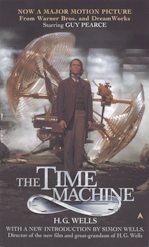
A classic science fiction novel
Ace 2002 movie edition cover
138 pages (left)
Ace books paperback 1990s
141 pages (right)
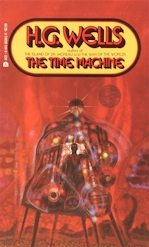
Denver Science Fiction & Fantasy Book Club |
 |
The Time Machine (1895) A classic science fiction novel Ace 2002 movie edition cover 138 pages (left) Ace books paperback 1990s 141 pages (right) |

|
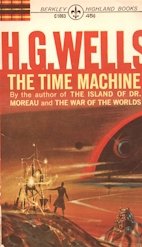 |
More book covers: The Time Machine |
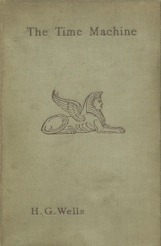 |
| Dan | 8 | Amy | 7 |
 |
10 Wow! Don't miss it 8-9 Highly recommended 7 Recommended 5-6 Mild recommendation 3-4 Take your chances 1-2 Below average; skip it 0 Get out the flamethrower! U Unfinishable or unreadable - Skipped or no rating given |
| Cheri | 5 | Barb | 9 | ||
| Aaron | 9 | Cynthia | 7 | ||
| Jackie | 8 |
|
Aaron's Commentary
H. G. Wells - The Time Machine
With the arguable exception of Mary Shelley's Frankenstein, this may be the most influential science fiction novel (or scientific romance, as Wells's SF stories came to be known at the time) ever written. For one thing, it introduced the concept of a time machine, which has since been borrowed by countless other authors (although someone else surely would have struck upon the idea if Wells had not). More importantly, Wells's use of science fiction as a medium for social commentary was ground-breaking. Wells was obviously greatly concerned about class divisions in modern society, and wrote this book as a cautionary tale of where social stratification may lead. Thankfully, Wells does not make his point simply by demonizing the upper class - if anything, the Eloi are presented with more sympathy than the Morlocks. This novel is not urging the working class to rise up against its oppressors; it is directed at the upper class, telling the members of the elite that they need to find a way to ensure that the lower class shares in the benefits of the advances they devise. The writing style in this novel is well ahead of its time, despite occasional lapses into pulpishness. Aside from the obligatory "this really happened" framework, the story moves quickly and draws the reader in without unnecessary melodrama. Although characterization was plainly not Wells's focus, he made a good choice in allowing Weena some human traits (although I have to confess I find the relationship between the childlike Weena and the time traveler mildly unsettling). I find it easy to empathize with the slightly pompous but very earnest time traveler. What do you think? Your comments are welcome. Please send them to vanaaron@excite.com |
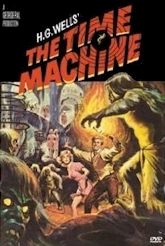 |
The Time Machine -- movie (1960) Galaxy Films / MGM. Starring Rod Taylor, Alan Young, Yvette Mimieux, and Sebastian Cabot. Screenplay by David Duncan. Producer / director George Pal. Running time 103 minutes. DVD cover (left) The Time Machine -- movie (2002) Warner Bros. and DreamWorks. Starring Guy Pearce, Samantha Mumba, Orlando Jones, Mark Addy, and Jeremy Irons. Director Simon Wells. |